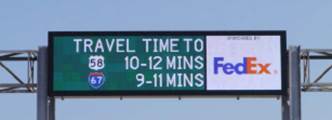Hunger for new money to pay for roads and bridges continues to push government to offer pieces of the public right of way for sale. This is worrisome in that it creates state-sponsored advertising which will compete with your out of home business.
Here’s the latest:
1.) What just happened in Maryland?
The governor signed legislation (April 24) to sell or lease naming rights for rest areas and welcome centers. Private entities that buy naming rights could “erect outdoor signs along the highway” to designate their sponsorships, if the federal government says okay.
2.) Really? Sponsorship signs are allowed on the highway?
Yes.
“For sponsorship of rest areas, one acknowledgment sign for each direction of travel may be installed on the highway mainline. Additional acknowledgment signs may be placed within the rest area, provided that these sign legends are not visible to highway mainline traffic,” says the most recent directive from FHWA (Federal Highway Administration).
3.) Is advertising allowed on the right of way?
No. The feds do not permit advertising on roadways. Signs that acknowledge sponsors, such as Adopt-A-Highway, are not considered advertising;
4.) Have other states sold naming rights for rest areas?
A few states, with mixed results. Iowa thought sale of naming rights would be a “cash cow,” but recently discontinued the program due to lack of interest, says Steven McMenamin, Iowa’s rest area administrator.
Geico sponsors rest areas and welcome centers in Virginia.

5.) Do disputes arise over copy?
Citing the First Amendment, the Klan prevailed in court when several states tried to block KKK groups from the Adopt-A-Highway program.
“The First Amendment protects everyone, even those with viewpoints as thoroughly obnoxious as those of the Klan, from viewpoint-based discrimination by the State,” said the US Eighth Circuit Court of Appeals, ruling against Missouri-DOT.

Typically, sale of naming rights and similar agreements would include standards to exclude offensive copy, such as profanity or promotion of illegal activities. Maryland’s new program can decline to sell naming rights for rest areas if the deal “is not in the public interest.”
Such exclusionary standards are akin to transit-ad agreements, which have been upheld. However, the Archdiocese of Washington, DC, is challenging the regional transit authority’s refusal to sell a Christmas-themed ad. The US Department of Justice filed a brief in federal appeals court supporting the Archdiocese.
5.) Since Donald Trump has been President, how have the feds treated proposals to expand commercial activities on the right of way?
Arizona wanted to privatize its rest areas, to add food and fuel service. FHWA said no (2018).
 Texas wanted to sell corporate sponsorships of official traffic signs (changeable-message LED corporate logos). FHWA said no (2017).
Texas wanted to sell corporate sponsorships of official traffic signs (changeable-message LED corporate logos). FHWA said no (2017).
A Pennsylvania motorist suggested the sale of ads on the back sides of overhead traffic signs. FHWA rejected that idea (2017), quoting the federal Manual that sets uniform standards for traffic signs: “Traffic control devices or their supports shall not bear any advertising or any other message that is not related to traffic control.”
6.) Who is pushing to loosen federal restrictions on the right of way?
Arizona’s governor (Douglas Ducey) argues that states should have more leeway to monetize the right of way. In 2012, Ohio politicians pushed to change federal law so states could commercialize rest areas that now are limited to vending machines, brochures, and restrooms. The US Senate defeated the proposal 86-12, siding with existing businesses located outside the right of way.
Billboard advertisers (truck stops, restaurants, convenience stores, and gas stations) oppose more full-service plazas on the highways.
7.) Will we see more proposals to sell parts of the right of way?
Yes, because roads and bridges are falling apart, the gas tax is outmoded, and Congress cannot agree on new ways to pay for transportation. Pressure to monetize right of way will continue.
[wpforms id=”9787″]
Paid Advertisement


















